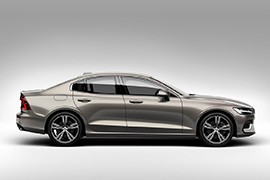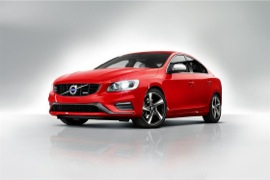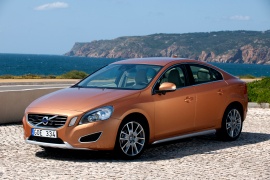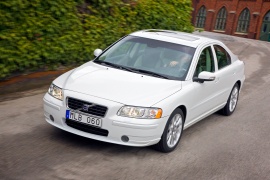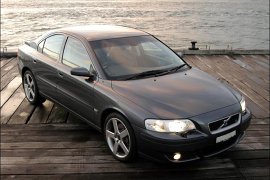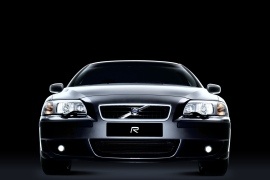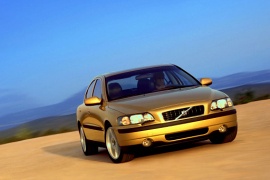VOLVO S60 Models/Series Timeline, Specifications & Photos
First production year: 2000
Engines: Gasoline, Hybrid, Diesel, Ethanol
The Volvo S60 is as global as a vehicle could be. The brand was from Sweden. Its owners were from China and the assembly plant in the U.S. And it was built for the Premium market.
A minimalist design both on the outside and on the inside, a clear brand image with its horizontal T-DRL in the headlights (T was from the Nordic god Thor) and only state-of-the-art engines and features.
The outside look is somehow similar to a shrunken S80 with which it shares the same SPA (Scalable Product Architecture). The rear shoulders over the fenders were typical for a Volvo. But it was more than a shorter S80. On the front, the bumper featured big air-scoops in front of the wheels, to cool the brakes. It was a sign of performance. And for most versions, it was true.
The interior was a carry-over from the V60. Usually, the station-wagon is launched after the sedan. In this case, the sedan was launched later. On the center console, there was a big infotainment unit touch-screen. The instrument cluster was another TFT display, which could have been configured by the driver to show the information needed, where it was needed.
But the biggest philosophy change was under the hood, where the Volvo left all the diesel engines out. Under the hood, there were only turbocharged gasoline engines and, for the top-of-the-range T8, a hybrid system with electric motors.
When it comes to the luxury sedan market, we must admit we’re mostly thinking of the BMW’s, Mercedes’ or Audi’s models. But how about a luxurious and incredibly safe luxury sedan?
The 2013 S60 was as stylish at it could get, offering cutting-edge safety systems, impressive comfort and powerful engines.
Wouldn’t you have felt safer if you knew your car would automatically stop if a collision is deemed imminent? The City Safe feature that the S60 would offer a great peace of mind in a world where smartphones, kids and other things could have distracted the drivers.
Optionally, a similar system that sensed pedestrians was available.
Three trim levels were available with the 2013 S60: T5, T6 and T6 R-Design.
Pretty well equipped in the base trim level, the luxury sedan 17-inch alloys, automatic headlights, heated side mirrors, automatic wipers, cruise control, dual-zone automatic climate control, cloth upholstery, Bluetooth connectivity, an USB port and an auxiliary audio jack.
Moving forward, the T6 trim level added a more powerful engine, an all-wheel-drive system, bigger 18-inch alloys, more efficient brakes, a tweaked suspension and a sport-tuned steering and the Premier Package included (keyless go, keyless entry, a sunroof, leather upholstery, etc. )
The top-of-the-range T6 R-Design features the most powerful engine available for the S60, distinctive alloys, a sport steering wheel and seats, a rear spoiler, and the Premium package included.
A 3.0-liter engine was fitted with the T6 R-Design, boasting 325 hp and 354 lb.-ft of torque. The power was sent to all of 4 wheels through a standard 6-speed automatic transmission.
VOLVO S60 1.6L D2 6AT FWD (115 HP)
VOLVO S60 1.6L D2 6MT FWD (115 HP)
VOLVO S60 2.0L D3 6AT FWD (136 HP)
VOLVO S60 2.0L D3 6MT FWD (136 HP)
VOLVO S60 2.0L D4 6AT FWD (163 HP)
VOLVO S60 2.0L D4 6AT Start & Stop FWD (163 HP)
VOLVO S60 2.0L D4 6MT FWD (163 HP)
VOLVO S60 2.0L D4 6MT FWD (181 HP)
VOLVO S60 2.0L D4 8AT FWD (181 HP)
VOLVO S60 2.4L D5 AWD 8AT (215 HP)
Already around for 10 years, the S60 was in need of a complete makeover to regain its position in the range.
Built on a shorter S80 platform, the mid-size sedan was 1 inch longer, 2 inches wider and a longer wheelbase compared to the previous model.
The classy interior design was modernised and still kept the “floating” center stack control panel.
Providing a more engaging drive than before, the S60 featured a quicker steering and provided the driver with a more sporty experience with a choice of suspension options.
The Swedish company was well-known for the cutting-edge technology included with its every model. The S60 was equipped with Pedestrian Detection with full auto brake.
A single trim level was available, with a 300 hp unit and an all-wheel-drive system. Front-wheel-drive and a new trim levels became available later on, and also a less powerful engine that developed 227 hp.
Standard features also included a tweaked suspension, 18-inch alloys, front sport seats, leather upholstery, dual-zone automatic climate control, Bluetooth connectivity, an 8-speaker sound system, iPod integration, USB port and an auxiliary audio jack.
The Premium package available added adaptive xenon headlights and a sunroof.
Other packages were available to enhance comfort and to provide more technology.
Stand-alone options included an adaptive suspension, 17-inch alloys, blind spot alert, keyless entry and dual display screens as a rear entertainment system.
VOLVO S60 1.6L DRIVe 6MT FWD (115 HP)
VOLVO S60 2.0L D3 6AT FWD (163 HP)
VOLVO S60 2.0L D3 6MT FWD (163 HP)
VOLVO S60 2.0L D4 6AT FWD (163 HP)
VOLVO S60 2.0L D4 6AT Start & Stop FWD (163 HP)
VOLVO S60 2.0L D4 6MT FWD (163 HP)
VOLVO S60 2.4L D5 6AT AWD (205 HP)
VOLVO S60 2.4L D5 6AT AWD (215 HP)
VOLVO S60 2.4L D5 AWD 6MT (205 HP)
VOLVO S60 2.4L D5 FWD 6AT (205 HP)
The Swedish company redesigned the Volvo S60 for the 2008 model. Being one of their best looking, mid-range sedan, the S60 looked like the shrunken version of the S80.
Under its skin, the S60 had great engineering used to protect its passengers, reason why Volvo was always on top of the list when it came to safety.
The small exterior changes consisted of a redesigned front grille and fascia to improve aerodynamics. For 2008, the turn signals were integrated into the outside mirrors.
The interior of the S60 was comfortable and roomy. Volvo stated that the front seats were designed using orthopaedic principles to ensure a better support on longer journeys.
Depending on the trim level, wood accents would be present on the glovebox lid and on the doors.
The gauges were easy to read and the switches were intuitively placed and easy to use while driving.
While the front seats offered great room and comfort, adults in the back may complain about the legroom available; headroom was not an issue.
The trunk of the S60 was roomy and could the load area could be increased by folding the rear seats (60/40 configuration).
The S60 had a good handling and was stable at high speeds.
While the R model was discontinued, the T5 sportier version of S60 had a strong acceleration performance.
VOLVO S60 2.0L T 5AT FWD (180 HP)
VOLVO S60 2.0L T 5MT FWD (180 HP)
VOLVO S60 2.4L 5AT FWD (140 HP)
VOLVO S60 2.4L 5AT FWD (170 HP)
VOLVO S60 2.4L 5MT FWD (140 HP)
VOLVO S60 2.4L 5MT FWD (170 HP)
VOLVO S60 2.4L T5 5AT FWD (260 HP)
VOLVO S60 2.4L T5 6MT FWD (260 HP)
VOLVO S60 2.5T 5AT FWD (210 HP)
VOLVO S60 2.5T 5MT FWD (210 HP)
After four years on the market, the revolutionary Volvo S60 was refreshed and brought cleaner engines and better safety systems.
As of January 2005, all vehicles registered in Europe had to fit in the Euro 4 pollution standards, and Volvo had to refresh its lineup. At that time, Volvo was still owned by Ford, and it has to use some of its technologies. But, in the end, Ford took some platforms and engines from the Swedish carmaker.
The S60 was designed with loads of biodesign trend themes. The facelifted version followed the same lines, but the car was enhanced in many areas. After all, it was a rounded vehicle that replaced the boxy-looking S70 (which was, in turn, a refreshed 850). Volvo installed clear lens headlights at the front and dark surround for them. The carmaker installed a new set of taillights with transparent glass and visible light bulbs in the back.
Inside, there was a big step forward to the premium-segment. Apart from higher quality materials, the carmaker introduced a new sound system that could get up to six-CDs on board. Volvo was concerned about the car's safety and insisted on offering the possibility of pairing a mobile phone to the car's audio system.
Under the hood, the Swedish engineers installed mostly turbocharged engines, either gasoline or diesel. All of them were used only by Volvo, and not by Ford. These engines could have been paired either to a manual or an automatic transmission.
Volvo had a very long motorsport history, and it decided to prove that when it introduced the R-version for its midsize sedan, the S60.
While most people knew Volvo vehicles for their safety systems, others knew about the Swedish carmaker's glorious motorsport heritage. The P144 Amazon was great in rallying. The S40 blasted the British Touring Car Championship, and Volvo engineers never stopped thinking about performance vehicles, but the company policy was safety first. Volvo S60 was made as a midsize premium vehicle, and adding more power to the car couldn't be bad news for anyone.
The R-version featured a similar design with its siblings, but with some special additions. At the front, the lower part of the bumper featured a larger air intake for better cooling. To complement the car's look, Volvo installed a satin-silver grille and a set of 17" light-alloy wheels, with w specific 5-spoke design. At the back, the design team put a small spoiler on the trunk lid.
Inside, the Swedish carmaker installed bucket seats at the front and a two-seat profiled bench in the back. For the instrument cluster, Volvo installed blue dials with silver surroundings and red needles. The audio system featured Bluetooth connectivity, which was not often seen on cars from that time.
Under the hood, Volvo installed a 5-cylinder turbocharged engine that sent its power in all corners via a 6-speed manual, and a 5-speed automatic was available as an option.
Volvo introduced the S60 lineup in 2000, and the car made a huge difference in the Swedish carmaker's design language.
Volvo was on its way to becoming more and more important in the premium car segment after it was purchased by Ford in 1999. Obviously, though, the mid-size sedan was designed long before the blue-oval carmaker acquired the Swedish brand. Thus, the S60 was considered by many as the last true Volvo.
With a design signed by Hungarian American designer Geza Loczi, the car sported plenty of rounded shapes, and there was not a single angular-shaped panel in the entire car. The front fascia resembled the former Viking boats, with the grill placed in an advanced position than the headlights. The curved beltline started from the front and was ended on the quarter panels forming what was then known as the "Volvo's shoulders." At the back, the sloped C-pillars looked fluid, emphasizing the new flow concept of the carmaker.
Inside, Volvo placed all the safety systems it could. Moreover, the car sported a small drawer where a SIM card for a mobile phone could have been placed. The bolstered seats featured the unique headrest design imagined by the Swedish carmaker safety team, which drastically reduced the risk of whiplash in case of a rear-end accident. Passengers in the back seats enjoyed enough room, despite the sloped roofline.
Under the hood, Volvo installed a choice of turbo-diesel and gasoline engines paired wither with a manual or an automatic transmission named Geartronic that allowed a manual mode. For those times, that was quite unusual.
